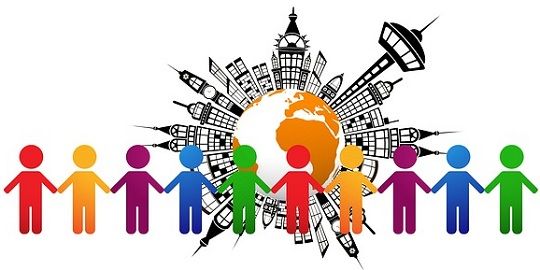(a) Culture is what we have achieved and civilization is what we aspire to achieve
(b) Culture is what comes out of intelligence and civilization is not
(c) Culture is secondary and civilization is primary
(d) Culture is what we are and civilization is what we have
Answer (D)

Understanding the Concepts: Setting the Stage
Firstly, let’s set the foundation by elucidating the core aspects of both Culture and Civilization. Culture is an intricate tapestry woven with threads of beliefs, customs, values, languages, and practices that individuals share within a community. It’s the essence that embodies the soul of a community, permeating every aspect of human life from rituals and ceremonies to daily activities, thus shaping individuals’ thoughts, behaviours, and interactions.
On the other hand, civilization is a more structured and tangible entity. It’s the manifestation of human organization at its pinnacle, showcasing advancements in social, political, and technological realms. Civilization encompasses cities, governmental institutions, technologies, economy, and various other structural and systemic elements that signify an organized, complex society.
Depth of Subjectivity vs. Architectural Objectivity
Culture carries a profound subjectivity, as it’s internalized and lived by individuals. It encapsulates human expressions, arts, languages, and shared beliefs that traverse beyond materialistic boundaries. Civilization, conversely, stands as a towering structure, representing objective achievements such as technology, infrastructure, governance, and social organization. This differentiation is crucial, as it positions culture as the essence, the lived experience, while civilization stands as the physical embodiment of societal advancements.

Evolutionary Trajectories: Organic vs. Intentional
Culture evolves in an organic manner, adapting, and molding based on historical, environmental, and social influences. It’s a living entity, constantly in flux, receptive to changes, and adaptable to shifting paradigms. Civilization, however, marches on a more intentional path. Societal structures, technological advancements, and organized systems are meticulously constructed, embodying human intent and design in an explicit manner.
Influence: Individual vs. Collective
The reach and influence of culture predominantly percolate into individual behaviors, thinking patterns, and decision-making processes. It subtly yet profoundly influences individuals’ worldview, perceptions, and interactions. Civilization influences at a macro level, affecting collective behavior, societal norms, regulations, and overall societal trajectory. It lays down the broad avenues of social navigation, encompassing law, politics, and technological pathways.
Transmission: Socialization vs. Multiple Modes
Culture primarily disseminates through intricate processes of socialization, stories, languages, and shared experiences. It’s passed down through generations, imbibing individuals with a sense of identity and belonging. Civilization, on the contrary, employs multiple avenues of transmission, ranging from formal education, legislative mechanisms, to historical archives and documented advancements.
Existential Domains: Specific vs. Generalized
Culture flourishes in the realms of specificity, often being unique to particular groups, communities, or societies. It signifies a distinctive identity, nuanced with unique beliefs, practices, and customs. Civilization embodies a more generalized facet, representing a broad canvas of human advancement and organization, often encompassing a multitude of cultures within its wide embrace.
Temporal Dynamics: Fluidity vs. Endurance
Cultures, despite their historical roots, can exhibit considerable fluidity. They are susceptible to transformations, adaptations, and shifts influenced by various external factors, including interactions with other cultures, globalization, or significant societal changes. Civilizations, in their structural grandeur, display a resilient endurance. Their transformation is a gradual process, marked by sustained periods of stability and slow shifts.
Closing Reflections
In closing, discerning between culture and civilization involves an intricate exploration of human societies’ fabric and evolutionary paths. The MA CUET exam question nudges towards a profound understanding of these concepts, crucial for delving deep into humanities and societal studies. Understanding these distinctions not only enriches intellectual horizons but also enhances the nuanced appreciation of the multifaceted human societies that grace our planet. The answer option that encapsulates these essences most accurately is option (d): “Culture is what we are, and civilization is what we have,” which succinctly captures the essence of these multifaceted concepts in a comprehensive manner.